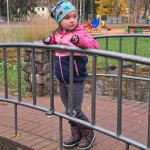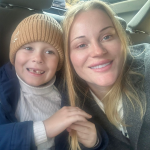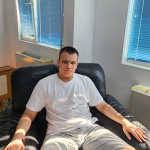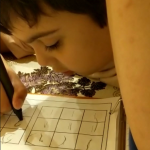Loved Ones as Therapists: How to Combat Autism Symptoms
Autism is one of those conditions that the public is relatively familiar with. However, not everyone fully understands the nature of the disorder and how it manifests. Nevertheless, parents are capable of becoming valuable allies to medical professionals in autism therapy and can help stabilize their child’s condition.
In general, Autism Spectrum Disorders (ASD) are neurodevelopmental conditions that negatively affect overall development speed, cognitive abilities, emotional and social skills, and physical well-being. ASD manifests through communication difficulties, speech irregularities, repetitive behaviors, and other “oddities.” But every autistic individual has not only challenges but also strengths, and the balance between these determines things like learning ability and problem-solving skills.
A child with autism may struggle to understand what others think or feel, may find it hard to communicate using words or gestures, and may be hypersensitive to bright lights or loud sounds—sometimes to the point of experiencing physical pain. Autism can also cause picky eating habits, which may lead to gastrointestinal issues. At the same time, intense interests in specific subjects can lead to exceptional abilities in areas like math, music, and more.
Autism Has No Single Cause
The effectiveness of autism treatment is hindered by the fact that it has no single cause—it develops through a combination of genetic, environmental, and other diverse factors. Potential contributors include:
• Parental age
• Complications during pregnancy or birth (extreme prematurity, low birth weight, etc.)
• Autism in close relatives
• Fragile X syndrome
• A short interval between the births of siblings
These factors primarily affect early brain development, neural connections, and interactions between different brain regions.
Recognizing Early Signs of Autism
The first signs of autism, which parents may notice, typically appear in early childhood (between 12 and 24 months) or even earlier and may persist throughout life. These signs fall into several key categories:
- Social Skills Deficits
The most noticeable and common, social development in autistic children tends to be slower than in neurotypical children. Warning signs include:
• Avoiding eye contact
• Preferring solitude
• Avoiding physical touch
• Difficulty understanding emotions, body language, and gestures
• Frequent anxiety and negative reactions to attempts at calming
• Refusing comfort even when distressed
- Communication Challenges
Communication also develops later, even if the child has normal hearing. Autism’s impact is highly individual—some children can communicate with ease, while others are completely nonverbal. Parents should consult a specialist if the child:
• Speaks later than peers and uses only simple words or short phrases
• Repeats the same phrase repeatedly
• Misuses pronouns (e.g., saying “you” instead of “I”)
• Struggles to initiate or maintain conversations, especially if the topic isn’t a personal interest
• Repeats questions even after receiving answers
- Motor and Behavioral Differences
Motor function issues often present through unusual behaviors. Common signs include:
• Repetitive movements like hand flapping, jumping, or walking in circles
• Rigid, unchanging movement patterns
• Strong preference for specific routines and distress over even minor changes
• Poor coordination
• Aggression toward self or others
• Difficulty maintaining attention for extended periods
The Role of Parents in Therapy
Professionals use various therapies to support children with autism—play therapy, speech therapy, occupational, physical, and behavioral therapy. However, parents can also provide significant support by:
• Learning about autism and the latest research
• Communicating closely with the child’s doctor
• Identifying triggers of negative behavior and sources of comfort
• Understanding the child’s strengths, weaknesses, and what brings them joy
It’s equally important to provide the child with personal space and a clear, consistent daily routine. This creates a predictable environment, boosts the child’s confidence and sense of security, and reduces anxiety. Parents should also give advance notice of any changes and offer positive reinforcement for good behavior or progress in developing skills.
Modern Approaches to Autism Treatment
Traditional autism therapies often require multiple interventions aimed at improving behavior, psychological state, and physical health. However, they are typically time-consuming, demanding, and not always effective. These limitations are not present in cellular therapy—an innovative, natural, safe, and significantly more effective method.
The key stage in cellular therapy is the transplantation of stem cells taken from the patient, which eliminates immune rejection. These cells are unique in their ability to transform into any other cell type, replacing damaged ones with healthy equivalents. As a result, brain and nervous system function normalizes, behavior improves, and cognitive development accelerates. Positive results appear shortly after the procedure and can last for many years—or even a lifetime—enhancing the effectiveness of other support strategies.
Cellular therapy for autism is no longer considered experimental; it is widely recognized and may become the primary treatment method in the future. It is already being used in leading medical centers around the world, including the Mardaleishvili Medical Center, which has extensive successful experience in the field. The center is staffed by highly qualified doctors using the latest equipment to achieve the best possible therapeutic outcomes. Treatment here is more affordable than in other countries, and additional advantages include a convenient location and full support with travel arrangements, accommodation, and other logistical needs.
Cellular therapy — a modern method for eliminating autism and its symptoms!
Autism Treatment Center Videos
Autism treatment with own stem cells
Cord blood association congress
International Quality Crown
Autism Treatment Reviews
Autism treatment with own stem cells
The story of Alessandro (6 years old)
Autism Patient Testimonial - Stem Cell Treatment
Clients Testimonials

Feedback from Yulia, mother of Emily (7 years old) Read More

Feedback by Everita, Katrina’s mother (5 years old) Read More

Feedback from Igor, David’s father (12 years old) Read More

Feedback from Olga, Fedya’s mother Read More

Feedback from Natalia, Radomir’s mother (15 years old) Read More












